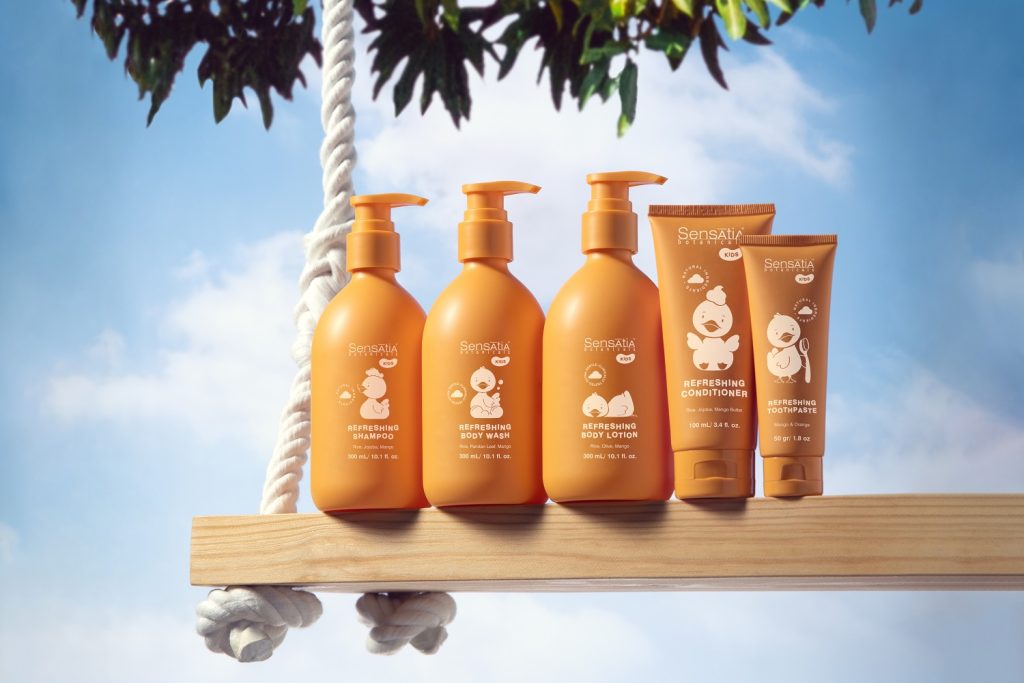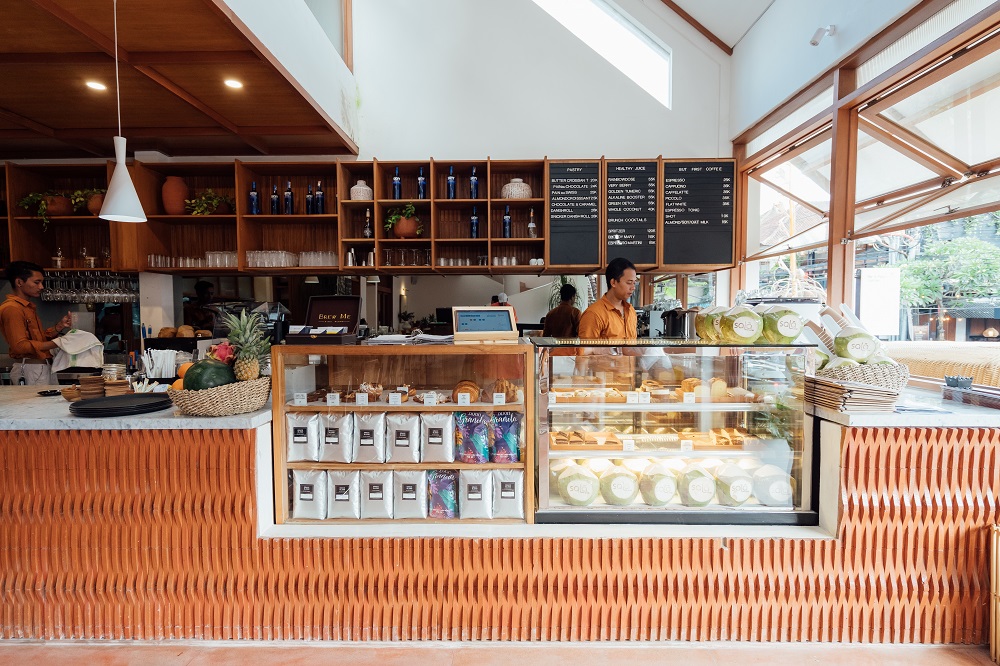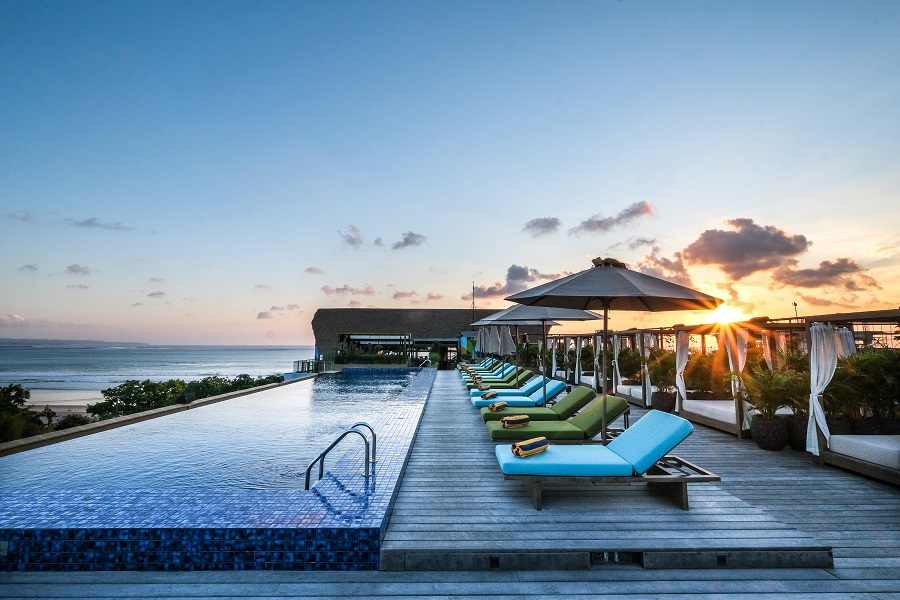Here we highlight some of the best charities in Bali, significant foundations and charitable who are addressing the often unseen challenges across the island. From empowering children’s education to providing lifesaving medical services and even saving Bali’s beloved animals, see how you can further their great efforts and help to make a difference.
The listed Bali foundations have been organised into the following categories:
• Community Empowerment
• Healthcare
• Children & Education
• Environment & Animal Welfare
Charities in Bali dedicated to improving the standard of living of individuals and communities, as well as a focus on providing essential healthcare needs.
East Bali Poverty Project
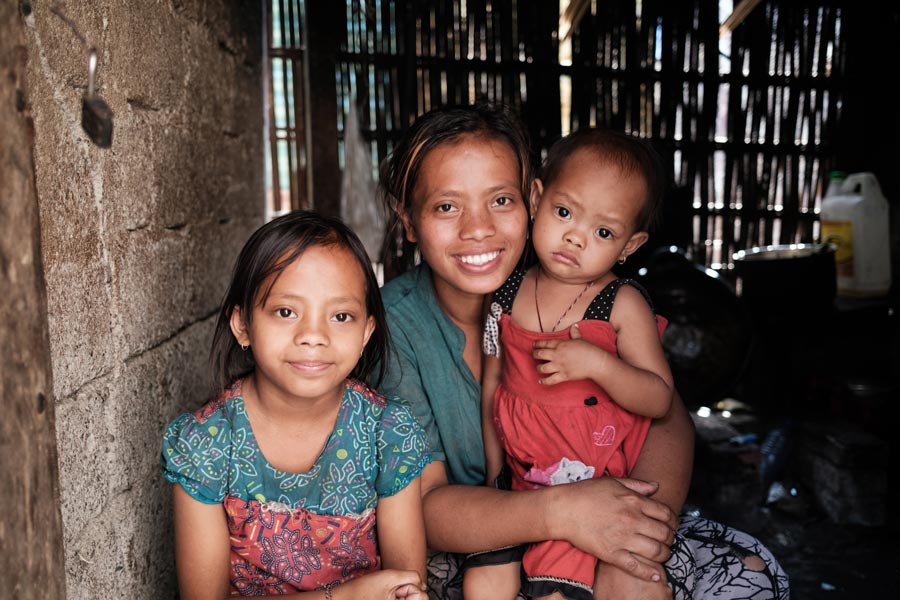
As its name reflects, East Bali Poverty Project (EBPP) is a non-profit organisation that focuses its efforts in one of Bali’s most remote regions, an isolated pocket of Karangasem Regency, found between Mt. Abang and Mt. Agung.
When the area was first surveyed it was found that thousands of people were living without water, sanitation, access roads, schooling, health facilities and electricity. The area had remained hidden from human progress, even its most basic forms. The literacy rate was nearly 0%. Yet, despite these dire circumstances, the population in the area asked for just one thing, children’s education, in hopes that this would be the foundation for the area’s improved future. This instilled the foundation’s philosophy of “helping people to help themselves.”
26 years on, EBPP has educated thousands of children, but over the years the scope and breadth of their community improvement programs grew and developed. Today, the organisation provides an integrated education to 222 children across six remote schools in Ban Village, where children are taught not only academic learning but life skills, leadership and empowerment lessons. Prior to the establishment of EBPP schools, the closest government schools were a minimum 1-2 hour walk through dirt roads.
Of course, in order to participate in schooling, children had to be healthy, and thus EBPP’s initiatives include health services, including: eradicating malnutrition and stunting among 3,900 ban villages, working with Udayana University Medical Faculty to develop a family model program that prioritises pregnant women, families with babies under 2-years-old and adolescent girls; plus working with Yayasan Peduli Kemanusiaan Bali (Humanity Care Foundation) to provide basic, Ear, Nose and Throat examination and treatment at 15 local schools, targeting 1,180 school students a year. Furthermore, EBPP has a program focused on improving the productivity of farmland, especially in the more isolated regions of Manikaji and Darmaji, introducing dryland regenerative agriculture to ensure sustainable soil fertility, water retention, food security and climate resilience.
How you can help
EBPP requires funding for 91 students at their Manikaji School, who are still short of the resources required to complete their academic studies. You can sponsor a child’s schooling for a whole year for US$ 325. EBPP also hopes to expand and replicate their malnutrition program which is based on a five-year malnutrition study, and there are also ongoing efforts to develop roads to Manikaji, Darmaji and Jatituhu, which will provide improved access the schools and health facilities for the surrounding communities.
@eastbalipovertyproject | eastbalipovertyproject.org
Muntigunung Foundation
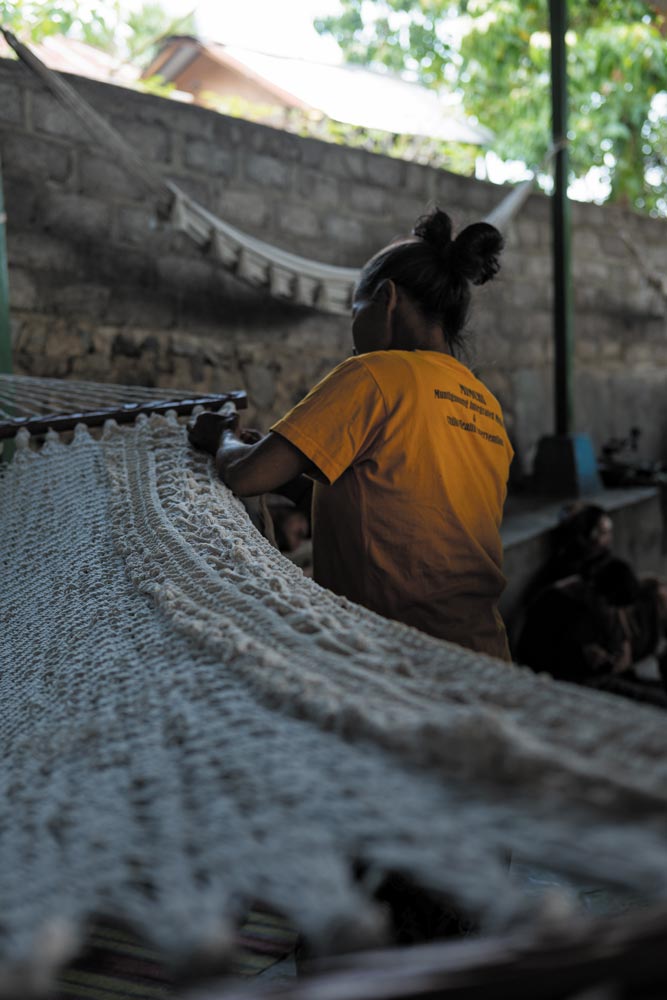
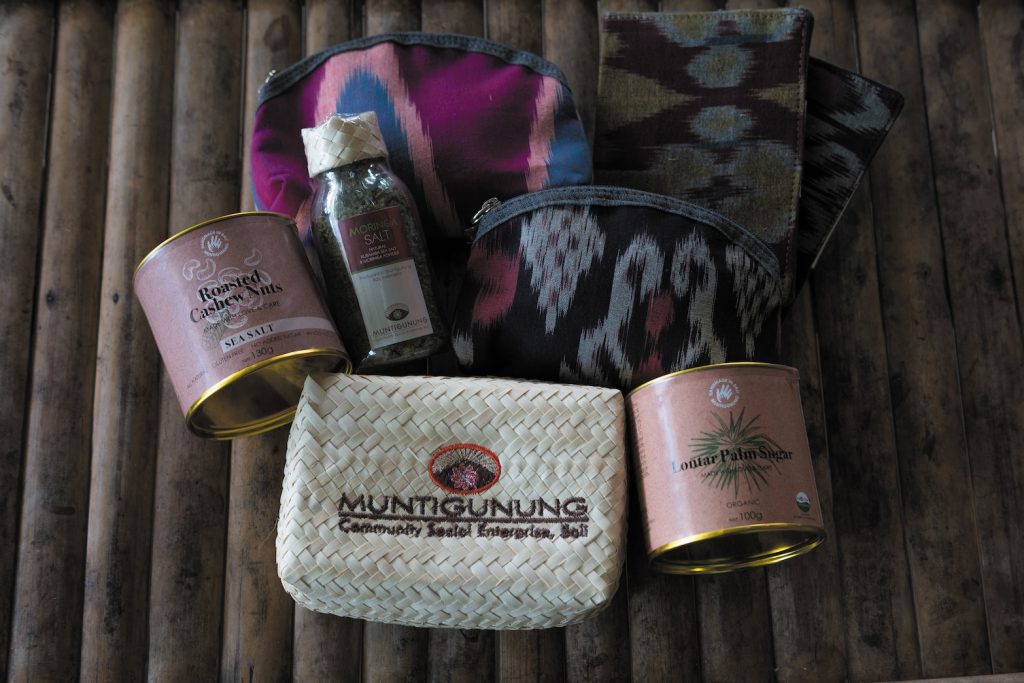
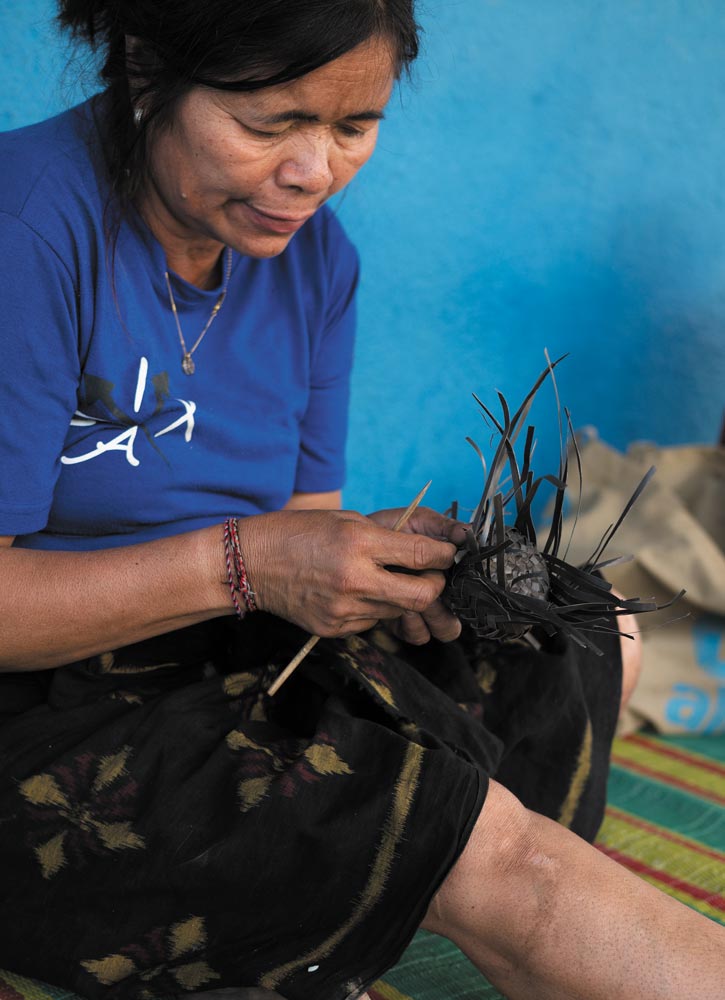
Nestled in the arid northeast of Bali, Muntigunung is a region often overshadowed by the island’s lush landscapes and tourist hotspots. Yet, behind its rugged beauty lies a community facing significant challenges, including poverty, lack of access to water, and limited opportunities for sustainable livelihoods.
The Muntigunung Foundation was established to address these issues head-on, providing a lifeline for the local population. Founded by individuals who recognised the stark inequalities in this region, the foundation focuses on empowering the community through sustainable development projects. Their goal is not merely to provide aid but to foster independence and resilience among the residents of Muntigunung.
At the heart of the foundation’s work is a commitment to sustainability. One of its most impactful initiatives has been the construction of rainwater harvesting systems, addressing the acute water scarcity that has long plagued the area. This innovative solution ensures families have access to clean water, reducing the time and effort spent on collecting it.
In addition to water projects, the foundation provides training programs that enable locals to produce high-quality goods such as cashews, rosella tea, and handcrafted hammocks. These products are sold with profits reinvested into the community. Such initiatives offer families a stable income and the dignity of self-sufficiency.
How to Help
Individuals and businesses can support the income of the Muntigunung community by purchasing their artisanal products, be it their local food produce or their handcrafted goods. Another great way to support would be joining the Muntigunung Trekking Experience, a journey into the mountains of north Bali to witness the community and directly support.
+62 361 424619 | info@muntigunung.com | muntigunung.com
Healthcare
Charities in Bali focused on providing healthcare to marginalised individuals and communities, ranging from disability care, blindness and natal care.
SoleFamily Indonesia
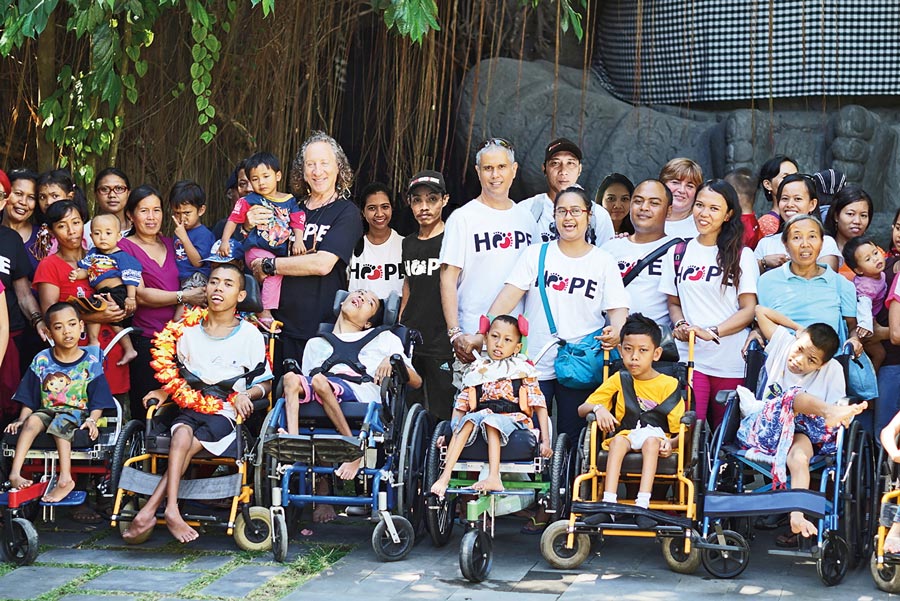
SoleFamily, formerly known as Solemen, is a Bali-based charity dedicated to uplifting the lives of disadvantaged individuals across the island. Through a hands-on, compassionate approach, the organisation supports the most vulnerable members of society, including children with disabilities, individuals living in extreme poverty, and those with chronic illnesses or untreated mental health conditions. SoleFamily’s holistic outreach program offers direct aid to individuals who often fall through the cracks of the public health and social systems.
Founded by Robert Epstone and Sarah Chapman, SoleFamily started as a grassroots initiative with a simple yet powerful mission to bring meaningful change to those in desperate need. This goes beyond poverty-stricken communities, as the foundation addresses the needs of those with very severe medical conditions without the means for proper medical care and attention. This includes children and adults with cerebral palsy, neurodevelopment disorders, chronic illnesses and rare diseases, mobility challenges and physical disabilities, and mental health disorders.
These are challenging cases even for financially sound families, so one can only imagine the difficulties faced by those in rural, secluded and financially marginalised regions. It is not only the individuals who suffer but also their families, who have little means nor access to the proper care required. As such, SoleFamily provides comprehensive support for them, including providing essential medical care and mobility aids to organising food supplies and home improvements. Over the years, they have built strong relationships with hospitals, healthcare providers, and other local charities to ensure long-term, sustainable assistance… these are not ‘one-and-done’ cases, but continued support for a lifetime. SoleFamily’s very direct-action approach to charity involves visiting homes and communities to assess individual needs. This allows them to provide customised care, whether through rehabilitation programs, wheelchairs, nutritional aid, or psychological support. The charity also works to rehouse families in dire situations, ensuring they have safe shelter and a chance to rebuild their lives.
Robert Epstone sadly passed away very recently, on 1 October 2024. His charity work transformed the lives of the island’s destitute, marginalised, and often forgotten individuals. His legacy continues through SoleFamily, and his work will endure as a beacon of hope for those in need.
How you can help
You can support SoleFamily in several ways. Donations go a long way in sustaining their efforts, from covering medical treatments to providing daily necessities. Monthly sponsorships also allow individuals to contribute regularly to the well-being of the families and individuals under SoleFamily’s care. Additionally, volunteers are welcome to join their outreach efforts, assisting with community visits and fundraising activities.
solefamily.org
The John Fawcett Foundation
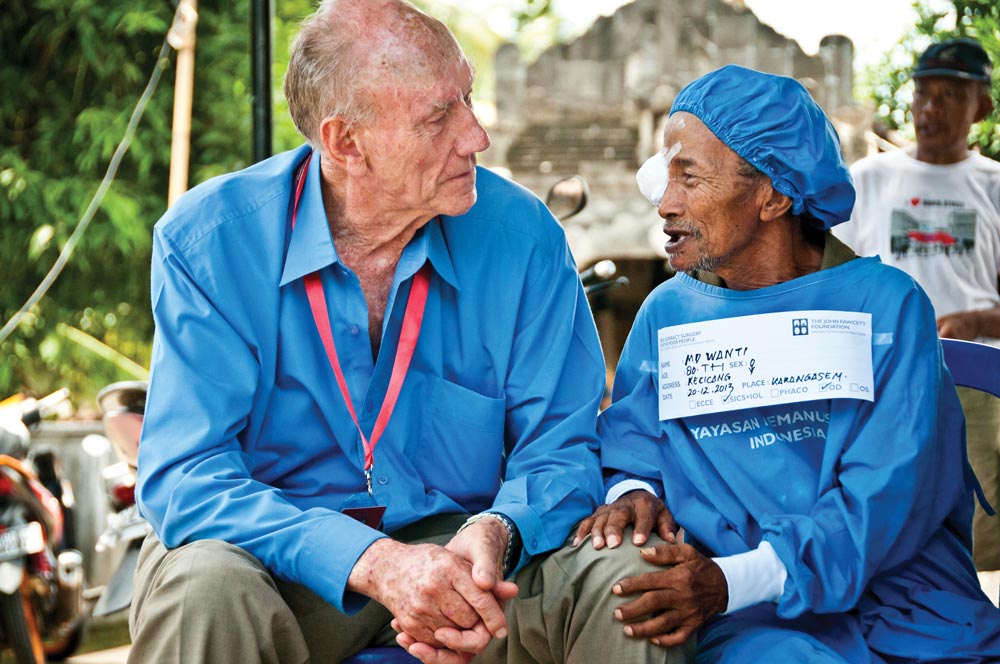
Giving the gift of sight, The John Fawcett Foundation is a humanitarian not-for-profit aimed at eradicating curable blindness in Indonesia. The foundation provides Indonesian citizens in lower socio-economic groups free services in sight restoration and blindness prevention.
It started in 1983 when the eponymous John Fawcett moved from Australia to Bali to recover from a life-threatening medical accident two years prior. During his time on the island, he saw a great need for medical assistance and mobilised Rotary Australia and Rotary International to begin the much-needed humanitarian work across Bali. It began with a Cleft Lip and Palate Program in 1989, and the Mobile Eye Clinic for Cataract Surgery in 1991. In 2000, one organisation brought all of these initiatives together, this was to become Yayasan John Fawcett Indonesia. John Fawcett passed away in 2017, but by this time he had developed a fabulously effective organisation that not only continues his vision to this day but also saw his outstanding humanitarian efforts recognised by Indonesian, Australian and International awards and commendations. These included both an Order of Australia (AM) in 2004 and a Satyalancana Kebaktian Sosial (National Indonesian Award) in 2008.
As mentioned, the work continues to this day. For many of us, having our eyes checked and purchasing glasses or contact lenses are mundane activities, but these are luxuries for some communities. One of JFF’s main initiatives on the island includes the Bali Village Eye Programs, whereby their mobile eye clinic offers eye checks, glasses, eye treatments, and even sight-restoring operations in rural villages across the island. This type of outreach allows JFF to truly get to the people most in need.
In 2024 alone (January-September) JFF conducted 101 Bali village eye programs, screening 20,998 people with eye problems or issues, offering 455 sight restorations and making and fitting 23 prosthetic eyes. In 2023, the foundation came across the rare cases of children, 2-6 years of age, who were cataract blind in both eyes and were able to operate and restore their eyesight by taking them to a local hospital in Denpasar. In 2023, JFF screened 4,783 school children, and 53,466 adults (and treated them), and provided 4,471 cataract operations. Finally, outreach and offshore programs extend JFF’s work beyond Bali’s borders, taking them to East Java, Central Kalimantan, Makassar, Lombok, Nusa Tenggara Barat and Nusa Tenggara Timur.
How you can help
John Fawcett Foundation provides opportunities for you to buy a Gift Card for another person, dedicating a good deed to them. Gift Cards offer the option of funding a cataract operation, prosthetic eye, ophthalmic equipment or simply the foundation itself. You can also purchase the inspiring biography of John Fawcett, written by Scott Bevan, which also funds the foundation. Of course, you can also give a bequest of your own choosing.
+62 361 270 812 | jff@johnfawcett.org | johnfawcett.org
Bumi Sehat Foundation
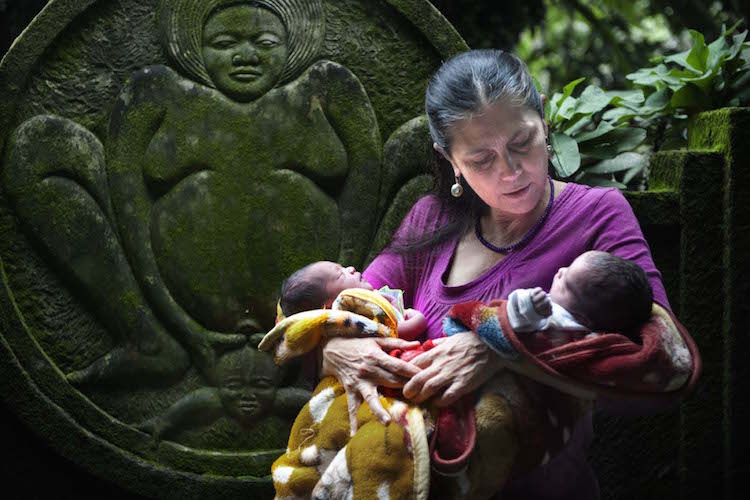
The Bumi Sehat Foundation is a humanitarian organisation dedicated to improving maternal and child health through respectful and sustainable healthcare practices. Established in 2003 by Ibu Robin Lim, the foundation grew from her vision of ensuring that mothers and babies have access to safe and dignified birthing environments. Her experiences witnessing the challenges of childbirth in underserved communities inspired the creation of a model that combines medical expertise with compassion and cultural sensitivity.
From its headquarters in Ubud, Bali, Bumi Sehat operates clinics in Bali, Aceh, and Papua. These clinics provide free prenatal, childbirth, and postpartum care, alongside general healthcare services for families. At the heart of Bumi Sehat’s work is the belief that empowering women with safe birthing experiences has a ripple effect on the health and well-being of entire communities.
In addition to maternal health services, Bumi Sehat engages in disaster relief, youth education programs, and environmental initiatives. By offering a holistic approach to community care, the foundation has become a beacon of hope for thousands of families, especially in areas with limited healthcare access.
By supporting Bumi Sehat, you’re not just helping individual families—you’re contributing to a healthier, more compassionate world.
How to Help
Bumi Sehat Foundation relies on the generosity of donors and volunteers to sustain its impactful work. Here’s how you can support their mission. Donations of any size help fund critical services such as medical supplies, staff wages, and clinic operations. Donations can be made directly through the foundation’s website. Sponsor a Program – Support specific initiatives like prenatal care, midwifery training, or youth education programs. Volunteer – The foundation welcomes skilled healthcare professionals, educators, and individuals passionate about making a difference.
bumisehat.org
Children & Education
NGOs and foundations investing in the future of Bali, its children. These Bali charities provide infrastructure and programs that focus on education and learning.
Bali Children Foundation
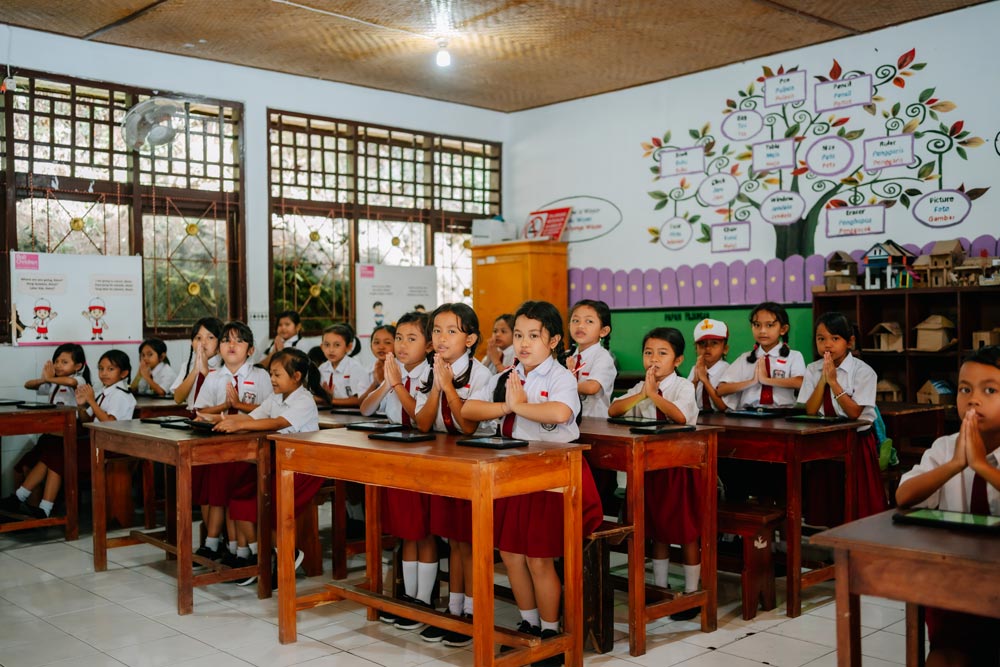
After the first Bali Bomb in October 2002, Margaret Barry witnessed the heroic and successful efforts of volunteers helping those injured, and how a community of Balinese, expatriates and tourists worked together for a common cause. She felt this could be harnessed for a greater cause. The Bali Bomb also opened her eyes to how isolated, impoverished and under-educated communities were susceptible to radicalisation, and saw that education was a way to elevate communities. This was the origin of the Bali Children Foundation (BCF).
The foundation has worked one village at a time in Bali, surveying remote areas to find underserved schools and transform them into successful academic centres. This includes a range of both hard and soft changes, including school renovations and full classroom upgrades, providing equipment and school supplies, developing libraries and building waste management facilities. BCF goes a step further, however, and has developed its own curriculum and teacher training programs (tailored to each location), implemented into BCF-improved schools. The curriculum is incredibly holistic, teaching reading, writing, numeracy, English language, S.T.E.M and computer modules, including EdTech facilities.
The results in education are phenomenal, often out-performing Indonesia’s national average, essentially leapfrogging the children from undereducated to academic stars. For example, BCF-engaged school scores for reading and counting are 34% higher than non-BCF school equivalents. For older students, the BCF Grade 12 scholarship graduates in 2023 saw 88% of them entering college, university, apprenticeships or were employed three months after leaving school.
For the deeply disadvantaged families across Bali and beyond, BCF also offers scholarships, which include school fees, uniforms, shoes, school bags, English dictionaries, books and stationery. The foundation also helps to bridge students with tertiary education scholarship opportunities. Outside of Bali, the Bali Children Foundation’s work extends to Lombok, the Gili Islands, West Sumba and Sumbawa.
To understand the scale of their work, here are some of their great achievements from 2023: 135 school, library and classroom upgrades (benefitting a total of 12,565 students), 54 schools improved, remedial literacy and numeracy EdTech delivered to 9 schools (1,753 grade 1 students), training for 20 BCF teachers and 53 government teachers.
How you can help
Bali Children Foundation invites you to donate for specific needs, initiatives or indeed to sponsor a child’s education. Their website also allows supporters to create their very own fundraising campaign with funds directly going to BCF. Otherwise, companies and brands can host events in collaboration with BCF to raise both funds and awareness. BCF is registered as an Indonesian, Australian and US charity
@balichildrenfoundation | balichildrenfoundation.org
BaliLife Foundation
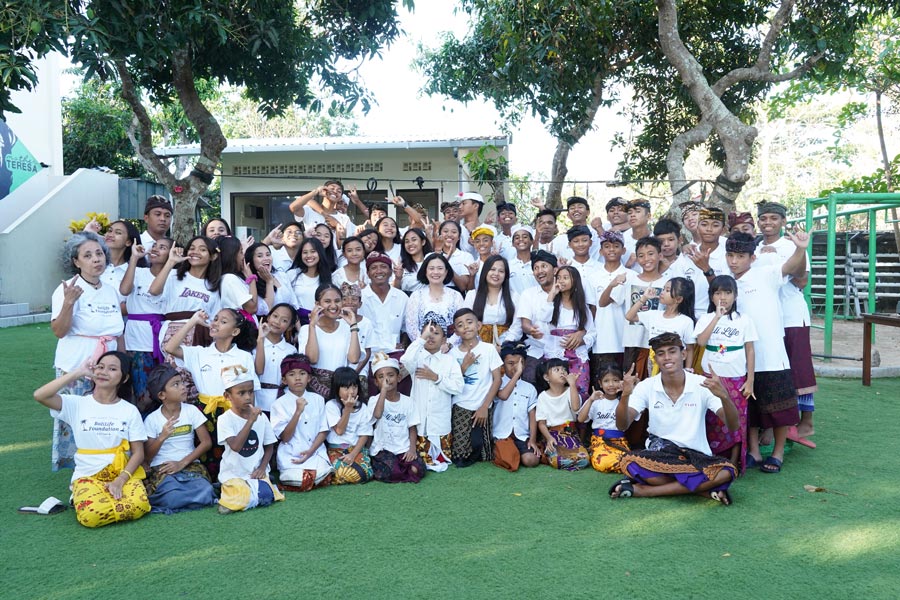
Founded in 2006, and now directed by Piter and Lyna Panjaitan, BaliLife Foundation houses, supports and empowers a broad range of disadvantaged individuals and communities. From managing a children’s home to organising women’s workshops and providing basic necessities to families living in difficult circumstances, this registered non-profit has many dependents.
BaliLife Foundation began first and foremost as a Children’s Home, providing a safe environment for orphaned, abandoned or rejected children. This started in 2005 when the Australian-Indonesian couple, Brad and Siska Little, met a nine-year-old boy living on the streets of Kuta, begging. This opened their eyes to the poverty that existed on the island and so, a year later, they opened BaliLife, growing the children’s home located in Uluwatu from two to now 50 children under their care. Poverty, homelessness and abuse are the three main reasons for children being left to fend for themselves, but BaliLife fills that void not only by providing shelter but also education, emotional support, social integration and of course a caring community to call their own. Children are looked after until they become self-sufficient adults, with 45 alumni now living independently and, as a result, enrolled in college.
“Growing up at BaliLife Children’s Home gave me not only a family but the education and life skills I needed to build my future. After leaving home, I started a small travel business, which has grown beyond my expectations. BaliLife taught me to dream big, work hard, and give back to my community. I am forever grateful for the love and support I received there,” shares Frans, one of the alumni.
In 2013, Siska’s brother, Piter, and his wife Lyna Panjaitan took over the directorship of the BaliLife Foundation. Through their leadership, the work has expanded. One way was to tackle the issue directly on the streets, opening a Street Kids Center and Women’s Workshop, this became a refuge for mums and children normally begging, providing informal classrooms, a library and a play area for children, whilst the women take part in workshops or handicraft work to earn a fair wage. Finally, BaliLife also opened the Suwung Community Centre, found at the centre of Bali’s notorious, 30-hectare landfill known as ‘Suwung’. Around 100 families live here, making money by sorting and selling trash materials. As such, their living conditions are dire, with a high risk of health conditions and their financial situation means children are unable to join formal school. So, BaliLife brings the school to them, providing education and activities for up to 60 children, as well as providing food for families and vocational training for adults.
How you can help
Bali Life Foundation welcomes a range of support, including short and long-term volunteers, providing handicraft opportunities for women’s workshops or ambassadors to build public awareness. Of course, there are great donation and sponsorship programs too, with US$50 enough to fund one child’s school fees, uniforms, books and resources for a month. Individuals and companies are welcome to sponsor a child’s future.
For parents in Bali with young children, BaliLife Daycare & Kindy is a long day care service and centre located in Uluwatu, a social enterprise whose profits go to supporting BaliLife Foundation.
@balilifefoundation | balilife.org
Environment & Animal Welfare
ROLE Foundation
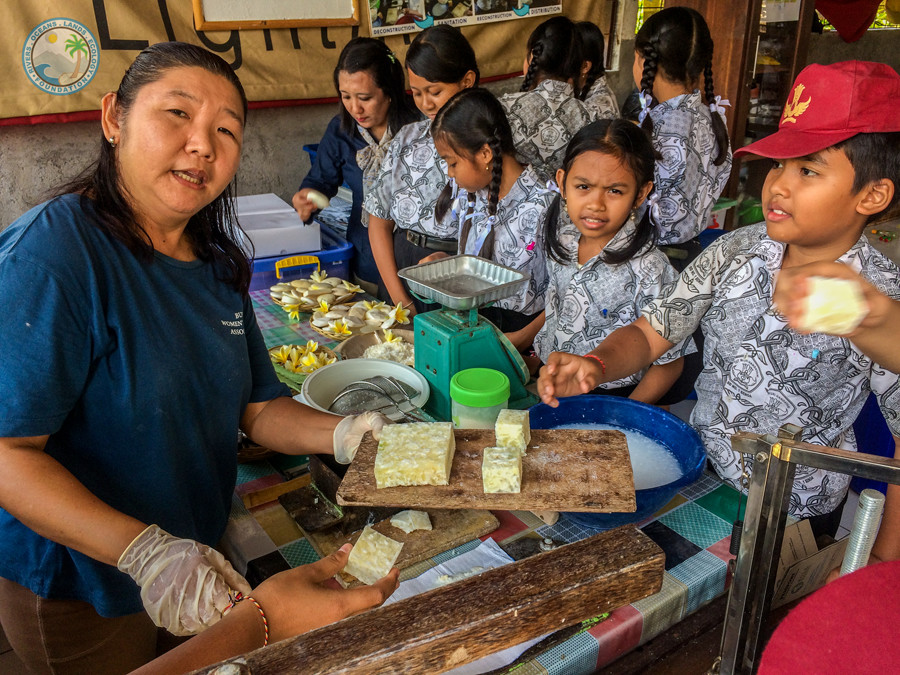
R.O.L.E. —which stands for Rivers, Oceans, Land, Ecology— focuses on education, bringing awareness of environmental factors and sustainable practices to local communities, foreign residents and tourists alike. The foundation is run by Fena Evans.
At the heart of all of this is the ZeroWaste Center in Nusa Dua. It is simultaneously a recycling and upcycling centre, educational destination and also provides income and resources for local communities. Through ten different ‘eco-stations’, the ZeroWaste Center showcases an array of great micro-businesses, innovative sustainable practices and ecological knowledge.
Another branch of ROLE is their Bali WISE (Women of Indonesia Skills Education) program, which has educated over 1750 women since its inception in 2007. Working closely with NGOs, orphanages and local schools, Bali WISE identifies marginalised and at-risk women who need help and will benefit from a life-changing skills education.
Though only six months long, the program produces superb results, with women transformed with new practical and life skills, plus, crucially, a real confidence in their own ability. The first half of the program is training at their Nusa Dua centre, providing a range of classes from basic hospitality workshops, to marketing, family planning, financial management and job interview skills.
For the next three months, students are given real practical training in a business, normally a hotel. Bali WISE even secures job placements for them after graduation. Importantly, students are supported throughout the program, provided with accommodation, meals, uniforms, learning materials and even a small monthly allowance (up to IDR 600.000, which many send to their families).
rolefoundation.org | baliwise.org
Seva Bhuana
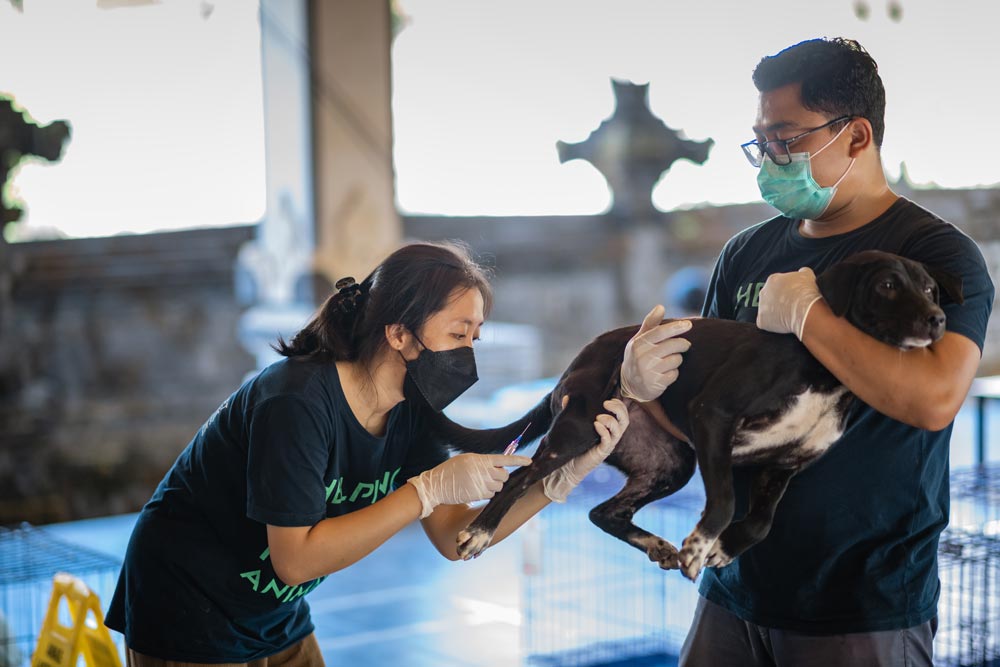
Walking the streets of Bali, one will see many seemingly stray cats and dogs, roaming freely and casually. However, many of these animals do indeed have a home, as the Balinese have a laissez-faire approach to pet ownership, granting their furry companions a lot of freedom. This does lead to some issues, unfortunately, with street animals and free-to-roam pets leading to increased populations, more stranded animals and spreading of disease. According to data from the Bali Province Agriculture and Food Security Service, there are an estimated 600,000 dogs roaming the streets across the island!
One community organisation, Seva Bhuana (officially established in 2016), is thought to tackle these issues head-on, with programs focused on subsidised sterilisations as well as community outreach and education. They work hand-in-hand with Bali Pet Crusaders, who started sterilisation programs back in 2014 that assist pet owners unable to afford veterinary fees. Moving from area to area, they provide free sterilisations and, when required, rabies vaccinations, to whole communities at a time, including in some of Bali’s more remote regions. They have sterilised over 32,000 cats and dogs since they began their program!
That is only one side of their work, of course. All would be in vain if communities were not taught about proper animal welfare. Thus began a concerted schools-engagement program in Tabanan Regency, where Seva Bhuana conducted one-day seminars for over 1,000 students in the region (2018); this grew into the ‘Training of Trainers’ program, whereby they shared a specific animal welfare curriculum with 500 elementary teachers to teach their students, spreading the word far and wide (2019). During COVID-19, they set up street feeding initiatives, including installing pet feeders in strategic locations, and continue these initiatives today with the help of BEM Udayana University and FKH Udayana University.
How you can help
Yayasan Seva Bhuana accepts donations to support either their sterilisation program and/or their ongoing education and outreach initiatives. Support can be given through their website, either as a one-time donation or you can become a monthly donor. Outside of financial support, you can hold an ‘education day’ together with Seva Bhuana to help continue the outreach to new areas and communities.
@sevabhuana | sevabhuana.org
